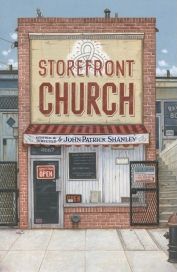DIME STORE PROPAGANDA
One of the problems with watching a play that has an agenda, political or otherwise, is the difficulty of enjoying with a good conscience even those parts that work; knowing the playwright’s intentions to be dishonest (in that he’s serving up propaganda as art), one feels foolish being affected emotionally, as though one has been duped by a cheap magic trick. Such is the case with John Patrick Shanley’s Storefront Church (Mr. Shanley also directs), a play in which some effective writing and very fine performances are wasted on a show whose existence is, at best, the result of an error in judgment.
In the play, a bank is foreclosing on a pensioner couple, Ethan Goldklang (Bob Dishy) and Jessie Cortez (the sassy Tonya Pinkins). Jessie tries to get the Bronx Borough President, Donaldo Calderon (Giancarlo Esposito), whom she’s known all his life, to help them. Donaldo is reluctant because his involvement may appear improper, but acquiesces after Jessie tells him that his own mother co-signed the loan. The bank CEO Tom Raidenberg (the devilishly charismatic Jordan Lage) offers to forgive the loan in exchange for Donaldo’s help in getting the Council’s permission to build a mall in the Bronx.
In his meeting with Tom, Donaldo is conflicted, on the one hand looking out for himself, his friends and his family, on the other sympathetic with his constituents who would rather get a new community center than a mall. “Minimum wage jobs,” Donaldo states. “My constituents are sick of that.” And subsequently, “This project needs to feel like the Bronx, not just anywhere U.S.A.”
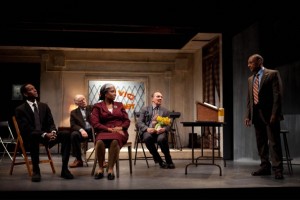 If this sounds sappy, that’s because Mr. Shanley’s play, partly in the writing but much more so in the way he directs it, appears to be making the argument that banks are bad, poor people are good, and a couple of pensioners need neither income nor a dwelling, provided they have love and spirituality. (As a counter to that last point, my suggestion for Mr. Shanley would be to go live in a Bronx park for a few winter months when he’s seventy, with nothing but love and spirituality, and see what happens.) But the point is not that the argument is naïve, which it is, it’s that artistic works have no business arguing their creators’ political agendas at the expense of their dramatic integrity. An artist’s responsibility is to the work, to see that it grows and blossoms into the best possible thing it can be, and not to bend and twist it into some monstrosity in order to serve his own personal vanity – then he becomes like the father who forces his son to play football when all his boy wants to play is the flute.
If this sounds sappy, that’s because Mr. Shanley’s play, partly in the writing but much more so in the way he directs it, appears to be making the argument that banks are bad, poor people are good, and a couple of pensioners need neither income nor a dwelling, provided they have love and spirituality. (As a counter to that last point, my suggestion for Mr. Shanley would be to go live in a Bronx park for a few winter months when he’s seventy, with nothing but love and spirituality, and see what happens.) But the point is not that the argument is naïve, which it is, it’s that artistic works have no business arguing their creators’ political agendas at the expense of their dramatic integrity. An artist’s responsibility is to the work, to see that it grows and blossoms into the best possible thing it can be, and not to bend and twist it into some monstrosity in order to serve his own personal vanity – then he becomes like the father who forces his son to play football when all his boy wants to play is the flute.
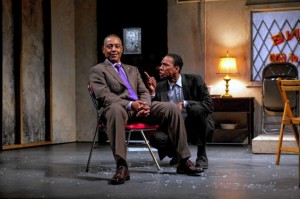 To be fair, Mr. Shanley’s argument is a bit broader: he is arguing spirituality versus materialism. And he’s not talking about simple, everyday spirituality, but about the kind that takes you to a higher plane of being, the kind that moves you, lifting you up out of the prison of your own vanity and making you one with God and Man and the Universe. Unfortunately, Mr. Shanley doesn’t appear to have enough to say on this most difficult and elusive subject; he shows us nothing revelatory or profound. Instead, spirituality is presented more as an idea and used as a device, a counter argument to material pursuits.
To be fair, Mr. Shanley’s argument is a bit broader: he is arguing spirituality versus materialism. And he’s not talking about simple, everyday spirituality, but about the kind that takes you to a higher plane of being, the kind that moves you, lifting you up out of the prison of your own vanity and making you one with God and Man and the Universe. Unfortunately, Mr. Shanley doesn’t appear to have enough to say on this most difficult and elusive subject; he shows us nothing revelatory or profound. Instead, spirituality is presented more as an idea and used as a device, a counter argument to material pursuits.
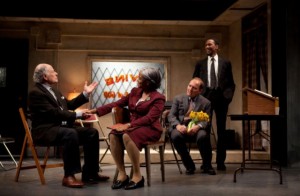 While Mr. Shanley’s intentions might have been good, his direction is peppered with sophomoric choices. In one scene Tom, the bank CEO, eats a gingerbread house meant as a gift for his child while having a one-hand-washes-the-other type of discussion with Donaldo regarding the foreclosure. A gingerbread house. The obviousness of the metaphor destroys its effect and feels condescending. It might have worked if, say, the house looked delicious, or if Tom, and subsequently Donaldo, were truly enjoying eating it, maybe getting some milk. Instead, the gingerbread appears dry and unappetizing, the eating staged.
While Mr. Shanley’s intentions might have been good, his direction is peppered with sophomoric choices. In one scene Tom, the bank CEO, eats a gingerbread house meant as a gift for his child while having a one-hand-washes-the-other type of discussion with Donaldo regarding the foreclosure. A gingerbread house. The obviousness of the metaphor destroys its effect and feels condescending. It might have worked if, say, the house looked delicious, or if Tom, and subsequently Donaldo, were truly enjoying eating it, maybe getting some milk. Instead, the gingerbread appears dry and unappetizing, the eating staged.
Two other scenes stand out as particularly nauseating. In each of these a solo character walks out onto the stage, and sits on a park bench to reflect while a recording of a sentimental ballad (which reflects what that character is thinking and feeling) booms from the speakers. These two pointless, embarrassing, redundant scenes are agonizing to watch; they are cringe-worthy. And the two songs are awful.
The depressing set (Takeshi Kata) looks like a student soundstage: poorly blocked, flat, dull and over-lit (lights by Matthew Richards). And the painted background, with its stylized clouds and high-rises, looks like a cheap, ugly reinvention of an El Greco painting.
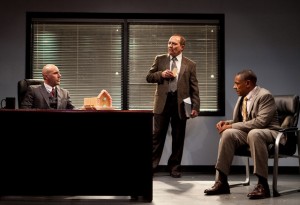 There are moments in Storefront Church that are funny and moving. Ron Cephas Jones is very convincing in an underwritten part as Chester Kimmich, a deeply spiritual Pentecostal pastor, and Zach Grenier is excellent as the loan officer, Reed Van Druyten, half of whose face is paralyzed from an injury. Unfortunately, Mr. Shanley’s attempts to weave the conflict between ecstatic spirituality and material reality into a plot incapable of sustaining it, along with his lopsided direction, ultimately results in a deformed offspring, afflicted with sentimentality and leftist propaganda.
There are moments in Storefront Church that are funny and moving. Ron Cephas Jones is very convincing in an underwritten part as Chester Kimmich, a deeply spiritual Pentecostal pastor, and Zach Grenier is excellent as the loan officer, Reed Van Druyten, half of whose face is paralyzed from an injury. Unfortunately, Mr. Shanley’s attempts to weave the conflict between ecstatic spirituality and material reality into a plot incapable of sustaining it, along with his lopsided direction, ultimately results in a deformed offspring, afflicted with sentimentality and leftist propaganda.
photos by Kevin Thomas Garcia
Storefront Church
Atlantic Theater Company and Linda Gross Theater in New York City
scheduled to end on June 24, 2012
for tickets, visit http://www.atlantictheater.org/page.aspx?id=12017140
